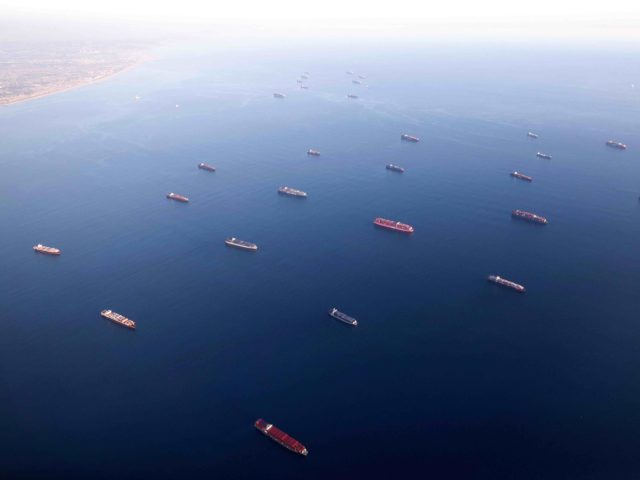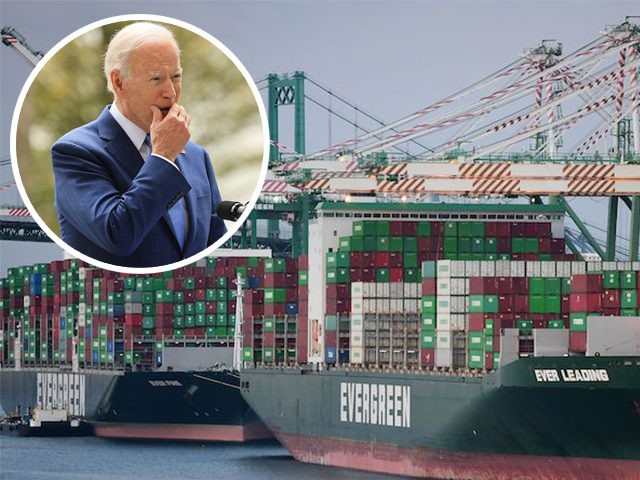The Port of Long Beach is not yet at 24/7 operations, despite President Joe Biden’s promise in October that the crucial cargo facility would be shifting to a round-the-clock schedule to alleviate a backlog of cargo ships that is hurting supply chains.
Port of Long Beach Executive Director Mario Cordero revealed in his annual “State of the Port” address on Wednesday that the port facility had not moved to a 24/7 schedule, though he commended Biden for helping start the “conversation”:
We will continue to advocate for transformational change – 24/7 operations.
Not just here but throughout the supply chain.
There are 168 hours in a week.
For the most part, our terminals are open less than half those hours.
Without expanding our terminals or building new facilities, we could handle still more cargo by utilizing more of those hours.
We’d also need truckers and warehouses to go 24/7.
With the Biden Administration’s help, the framework for 24/7 supply chain operations has been established.
We’ve started the conversation.
And we will continue the conversation.
In October, with record numbers of cargo ships lining up outside the Long Beach and Los Angeles Ports, Biden declared:
After weeks of negotiation and working with my team and with the major union and retailers and freight movers, the Ports of Los Angeles — the Port of Los Angeles announced today that it’s going to be — begin operating 24 hours a day, 7 days a week.
This follows the Port of Long Beach’s commitment to 24/7 that it announced just weeks ago.
Twenty-four/seven system — what most of the leading countries in the world already operate on now, except us, until now.
This is the first key step toward moving our entire freight transportation and logistical supply chain, nationwide, to a 24/7 system.
And here’s why it matters: Traditionally, our ports have only been open during the week — Monday through Friday — and they’re generally closed down at nights and on weekends. By staying open seven days a week, through the night and on the weekends, the Port of Los Angeles will open — over 60 extra hours a week it will be open. In total, that will almost double the number of hours that the port is open for business from earlier this year.
However, Breitbart News reported at the time, the plan struggled at the outset because there were not enough truckers and warehouse workers willing to work the overnight shift: “Analysts who have looked into the supply chain problem say it is not the hours of operation at the ports that is the major hold up. Instead, the constraints are shortages of truck drivers and warehouse employees. These were in short supply during regular hours and are extremely difficult to put in place for a 3 a.m. shift. And there is a shortage of truck chassis themselves.”

In an aerial view, container ships are anchored by the ports of Long Beach and Los Angeles as they wait to offload on September 20, 2021 near Los Angeles, California. Amid a record-high demand for imported goods and a shortage of shipping containers and truckers, the twin ports are currently seeing unprecedented congestion. On September 17, there were a record total of 147 ships, 95 of which were container ships, in the twin ports, which move about 40 percent of all cargo containers entering the U.S. (Photo by Mario Tama/Getty Images)
The administration did succeed in encouraging shipping companies to move empty containers off the dock by threatening daily fines. However, the Wall Street Journal reported last month, many of these incoming containers were simply replaced by outgoing ones that remain waiting on the dock.
The number of vessels waiting to dock hit a record level of 109 in early January. On the bright side, Cordero revealed that the Port of Long Beach “has already met all our 2023 emission-reduction targets” by cutting emissions from ships, vehicles, and equipment.
Joel B. Pollak is Senior Editor-at-Large at Breitbart News and the host of Breitbart News Sunday on Sirius XM Patriot on Sunday evenings from 7 p.m. to 10 p.m. ET (4 p.m. to 7 p.m. PT). He is the author of the recent e-book, Neither Free nor Fair: The 2020 U.S. Presidential Election. His recent book, RED NOVEMBER, tells the story of the 2020 Democratic presidential primary from a conservative perspective. He is a winner of the 2018 Robert Novak Journalism Alumni Fellowship. Follow him on Twitter at @joelpollak.

COMMENTS
Please let us know if you're having issues with commenting.